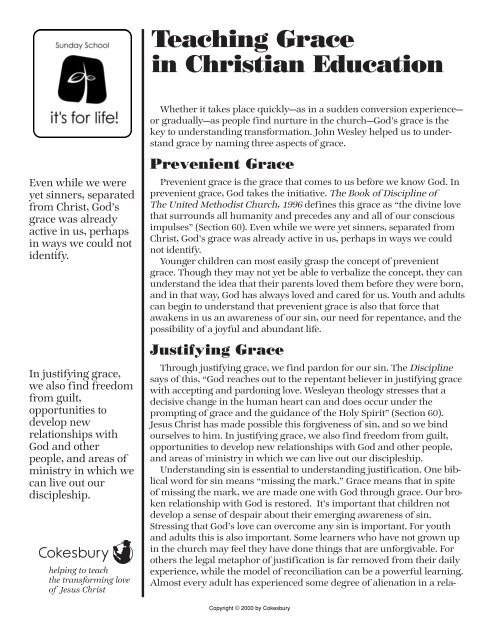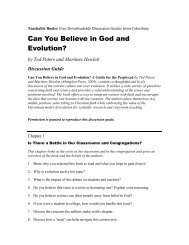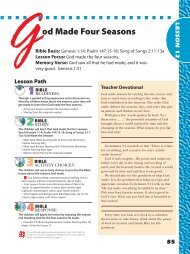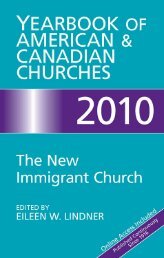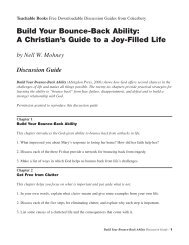Teaching Grace in Christian Education - Sunday School -- It's for Life ...
Teaching Grace in Christian Education - Sunday School -- It's for Life ...
Teaching Grace in Christian Education - Sunday School -- It's for Life ...
You also want an ePaper? Increase the reach of your titles
YUMPU automatically turns print PDFs into web optimized ePapers that Google loves.
<strong>Teach<strong>in</strong>g</strong> <strong>Grace</strong><br />
<strong>in</strong> <strong>Christian</strong> <strong>Education</strong><br />
Even while we were<br />
yet s<strong>in</strong>ners, separated<br />
from Christ, God’s<br />
grace was already<br />
active <strong>in</strong> us, perhaps<br />
<strong>in</strong> ways we could not<br />
identify.<br />
In justify<strong>in</strong>g grace,<br />
we also f<strong>in</strong>d freedom<br />
from guilt,<br />
opportunities to<br />
develop new<br />
relationships with<br />
God and other<br />
people, and areas of<br />
m<strong>in</strong>istry <strong>in</strong> which we<br />
can live out our<br />
discipleship.<br />
help<strong>in</strong>g to teach<br />
the trans<strong>for</strong>m<strong>in</strong>g love<br />
of Jesus Christ<br />
Whether it takes place quickly—as <strong>in</strong> a sudden conversion experience—<br />
or gradually—as people f<strong>in</strong>d nurture <strong>in</strong> the church—God’s grace is the<br />
key to understand<strong>in</strong>g trans<strong>for</strong>mation. John Wesley helped us to understand<br />
grace by nam<strong>in</strong>g three aspects of grace.<br />
Prevenient <strong>Grace</strong><br />
Prevenient grace is the grace that comes to us be<strong>for</strong>e we know God. In<br />
prevenient grace, God takes the <strong>in</strong>itiative. The Book of Discipl<strong>in</strong>e of<br />
The United Methodist Church, 1996 def<strong>in</strong>es this grace as “the div<strong>in</strong>e love<br />
that surrounds all humanity and precedes any and all of our conscious<br />
impulses” (Section 60). Even while we were yet s<strong>in</strong>ners, separated from<br />
Christ, God’s grace was already active <strong>in</strong> us, perhaps <strong>in</strong> ways we could<br />
not identify.<br />
Younger children can most easily grasp the concept of prevenient<br />
grace. Though they may not yet be able to verbalize the concept, they can<br />
understand the idea that their parents loved them be<strong>for</strong>e they were born,<br />
and <strong>in</strong> that way, God has always loved and cared <strong>for</strong> us. Youth and adults<br />
can beg<strong>in</strong> to understand that prevenient grace is also that <strong>for</strong>ce that<br />
awakens <strong>in</strong> us an awareness of our s<strong>in</strong>, our need <strong>for</strong> repentance, and the<br />
possibility of a joyful and abundant life.<br />
Justify<strong>in</strong>g <strong>Grace</strong><br />
Through justify<strong>in</strong>g grace, we f<strong>in</strong>d pardon <strong>for</strong> our s<strong>in</strong>. The Discipl<strong>in</strong>e<br />
says of this, “God reaches out to the repentant believer <strong>in</strong> justify<strong>in</strong>g grace<br />
with accept<strong>in</strong>g and pardon<strong>in</strong>g love. Wesleyan theology stresses that a<br />
decisive change <strong>in</strong> the human heart can and does occur under the<br />
prompt<strong>in</strong>g of grace and the guidance of the Holy Spirit” (Section 60).<br />
Jesus Christ has made possible this <strong>for</strong>giveness of s<strong>in</strong>, and so we b<strong>in</strong>d<br />
ourselves to him. In justify<strong>in</strong>g grace, we also f<strong>in</strong>d freedom from guilt,<br />
opportunities to develop new relationships with God and other people,<br />
and areas of m<strong>in</strong>istry <strong>in</strong> which we can live out our discipleship.<br />
Understand<strong>in</strong>g s<strong>in</strong> is essential to understand<strong>in</strong>g justification. One biblical<br />
word <strong>for</strong> s<strong>in</strong> means “miss<strong>in</strong>g the mark.” <strong>Grace</strong> means that <strong>in</strong> spite<br />
of miss<strong>in</strong>g the mark, we are made one with God through grace. Our broken<br />
relationship with God is restored. It’s important that children not<br />
develop a sense of despair about their emerg<strong>in</strong>g awareness of s<strong>in</strong>.<br />
Stress<strong>in</strong>g that God’s love can overcome any s<strong>in</strong> is important. For youth<br />
and adults this is also important. Some learners who have not grown up<br />
<strong>in</strong> the church may feel they have done th<strong>in</strong>gs that are un<strong>for</strong>givable. For<br />
others the legal metaphor of justification is far removed from their daily<br />
experience, while the model of reconciliation can be a powerful learn<strong>in</strong>g.<br />
Almost every adult has experienced some degree of alienation <strong>in</strong> a rela-<br />
Copyright © 2000 by Cokesbury
John Wesley used<br />
the metaphor of the<br />
house to expla<strong>in</strong> this<br />
concept. He saw prevenient<br />
grace as the<br />
porch of the house,<br />
an entryway, that<br />
<strong>in</strong>vites us to come<br />
further. Justify<strong>in</strong>g<br />
grace is the door<br />
<strong>in</strong>to the house. We<br />
must open it and<br />
come <strong>in</strong>side if we<br />
truly are to experience<br />
and know the<br />
whole house.<br />
Sanctify<strong>in</strong>g grace is<br />
learn<strong>in</strong>g to live <strong>in</strong><br />
and grow <strong>in</strong> the<br />
whole house.<br />
tionship, or a feel<strong>in</strong>g of be<strong>in</strong>g an outsider, different from others. To compare<br />
the mov<strong>in</strong>g experience of reconcil<strong>in</strong>g with a friend, spouse, or family<br />
member can be a great breakthrough. These experiences are very real <strong>for</strong><br />
children, and so this can be a helpful place to beg<strong>in</strong> <strong>in</strong> teach<strong>in</strong>g children<br />
about grace.<br />
Sanctify<strong>in</strong>g <strong>Grace</strong><br />
Sanctify<strong>in</strong>g <strong>Grace</strong> is a purify<strong>in</strong>g and cleans<strong>in</strong>g process that cont<strong>in</strong>ues<br />
throughout our lives as disciples of Jesus Christ. Sanctify<strong>in</strong>g grace is the<br />
“bear<strong>in</strong>g fruit” part of God’s grace. Through sanctification, accord<strong>in</strong>g to<br />
the Discipl<strong>in</strong>e, “we are enabled to <strong>in</strong>crease <strong>in</strong> the knowledge and love of<br />
God and <strong>in</strong> love <strong>for</strong> our neighbor” (Section 60). For Wesley sanctify<strong>in</strong>g<br />
grace is the power that leads us on toward becom<strong>in</strong>g more Christlike.<br />
The concept of <strong>Christian</strong> perfection can be daunt<strong>in</strong>g to those only too<br />
aware of their own fail<strong>in</strong>gs. Younger children can confuse “be<strong>in</strong>g good” at<br />
home with be<strong>in</strong>g acceptable to God. Middle-school aged youth, on the<br />
other hand, often seem to go through a period of great <strong>in</strong>terest <strong>in</strong> and<br />
attachment to schedules, rules, and procedures. It’s a healthy part of the<br />
growth process, but it’s important that <strong>Christian</strong> perfection be leavened<br />
with humility.<br />
These understand<strong>in</strong>gs of grace do not exist <strong>in</strong> isolation. Together, they<br />
<strong>for</strong>m a way of see<strong>in</strong>g and experienc<strong>in</strong>g the <strong>Christian</strong> life as an ongo<strong>in</strong>g,<br />
dynamic process. John Wesley used the metaphor of the house to expla<strong>in</strong><br />
this concept. He saw prevenient grace as the porch of the house, an entryway,<br />
that <strong>in</strong>vites us to come further. Justify<strong>in</strong>g grace is the door <strong>in</strong>to the<br />
house. We must open it and come <strong>in</strong>side if we truly are to experience and<br />
know the whole house. Sanctify<strong>in</strong>g grace is learn<strong>in</strong>g to live <strong>in</strong> and grow <strong>in</strong><br />
the whole house.<br />
<strong>Teach<strong>in</strong>g</strong> and learn<strong>in</strong>g are important ways through which we allow the<br />
Holy Spirit access to our heart, m<strong>in</strong>d, and will. As the Holy Spirit works <strong>in</strong><br />
us, we are trans<strong>for</strong>med <strong>in</strong>to the image of Christ. The <strong>in</strong>tent of our teach<strong>in</strong>g<br />
is to <strong>in</strong><strong>for</strong>m and to <strong>for</strong>m, to create conditions <strong>in</strong> which persons can open<br />
themselves to God and where the ongo<strong>in</strong>g work of trans<strong>for</strong>mation can<br />
beg<strong>in</strong>. This process may happen as we study the Scriptures <strong>in</strong>dividually. It<br />
can take place as we learn and experience biblical truths through<br />
<strong>Christian</strong> community <strong>in</strong> a <strong>Sunday</strong> school class or small group.<br />
Teachers are sometimes granted the great gift of watch<strong>in</strong>g God’s grace<br />
at work <strong>in</strong> the life of a learner. As they build a mature faith, the small<br />
seeds we plant through the m<strong>in</strong>istry of teach<strong>in</strong>g take root and br<strong>in</strong>g <strong>for</strong>th<br />
the fruit <strong>in</strong> God’s good time.<br />
X036631<br />
<strong>Teach<strong>in</strong>g</strong> <strong>Grace</strong> <strong>in</strong> <strong>Christian</strong> <strong>Education</strong> is published by Cokesbury and is available <strong>for</strong> free<br />
distribution. Permission is granted to duplicate <strong>for</strong> church use. For additional <strong>in</strong><strong>for</strong>mation<br />
about curriculum resources, call Curric-U-Phone at 800•251•8591, or email<br />
curricuphone@umpublish<strong>in</strong>g.org


